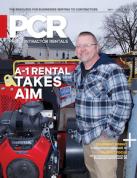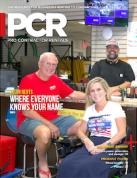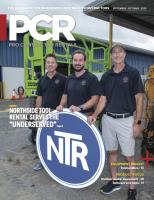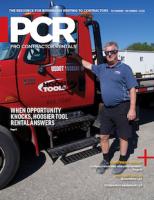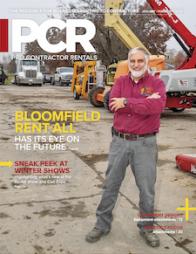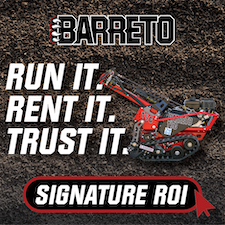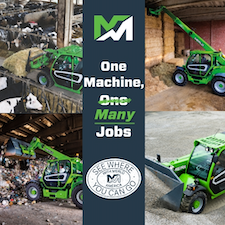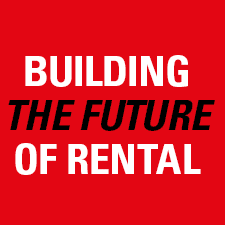Becoming independent
Opening in 2020, Rental Equipment Center owners leverage their decades of experience gained from working with national and independent rental centers.
Every industry has the submarine phenomenon. That’s where seasoned professionals leave their place of employment, then seemingly travel under the radar, only to pop up somewhere else in the industry. This phenomenon gets even more noticeable as mergers and acquisitions take place in an industry.
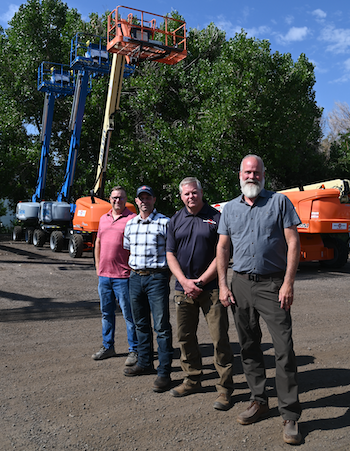 |
| Rental Equipment Center owners (L to R) Phillip Priolo, Troy Miller, Jerry Morin and Bill Armstead. |
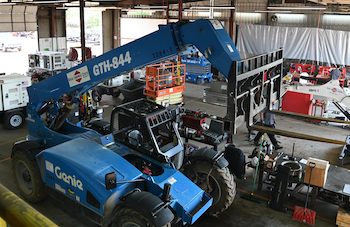 |
| You’ll find everyone, from top management down to laborers, working in the 7,000 square-foot, drive-through four bay maintenance shop. “It’s mentoring on a daily basis. Management will sit at the counter, walk the yard and is always ready to offer to help and coach the employees,” says Armstead. |
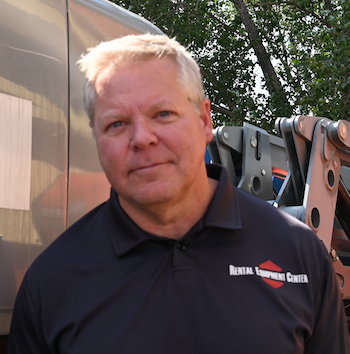 |
| “We actually grew through COVID. We were able to add to our fleet at a very low average cost, and by the end of 2020, our fleet value had grown to $18 million and by the end of 2021, it was $44 million and at the end of 2022, we expect it to be at more than $60 million,” says Morin. |
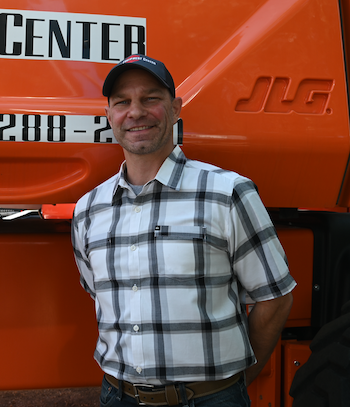 |
| "In the last two years, Miller says Rental Equipment Center has proven its concept to financial investors. “We now have two locations, one in Denver and Fort Collins with plans to open a third location in Colorado Springs in 2023. By then we will have nearly 70 employees and a total fleet value of $80 million.” |
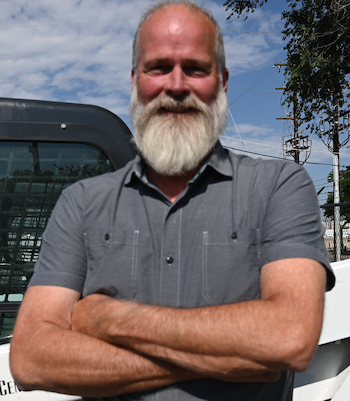 |
| “We are deep in talent in every position. We spend a significant amount of time focused on training the next generation of rental professionals. We provide individuals an opportunity to excel; built on a strong foundation of core business principles, safety, and a positive customer experience,” says Armstead. |
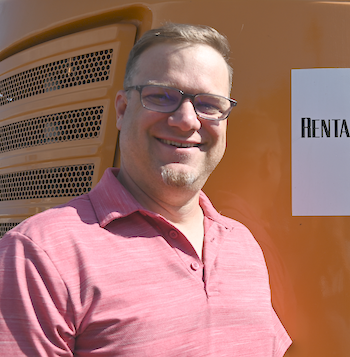 |
| “We have a large backlog of ordered equipment and with our expansion plans, we need to make sure we have the equipment we need. We are looking at what we will need in 2024 and 2025 now, and the cost of that equipment is unknown,” says Priolo. |
The equipment rental industry is no exception, and Rental Equipment Center, which started in late 2019 out of Denver, Colorado, is an apt example.
Jerry Morin, president; Troy Miller, chief financial officer; Bill Armstead, general manager; and Phillip Priolo, fleet manager, have all worked with each other at some time or another in their careers that span as much as 40-plus years.
“I have been working in equipment rental since I was 21 years old as a driver for Center Rental in Denver and Bill was in sales for them in Fort Collins. This was in the mid-’80s and when Center Rental was sold to RSC in the late 90s, Morin and Armstead went to work for RSC. Bill reported to Greg Harrington, who was the regional RSC vice president,” says Morin.
While at RSC, Morin and Armstead learned the ropes of equipment rental through the eyes of the ever-expanding company, but eventually went their separate ways.
“Bill went into a mobile mini business and I went to work for United Rentals in Denver as a sales representative for four years before moving to Minnesota as a United Rentals branch manager. Two years later, I returned to Colorado to work for a startup independent,” Morin says.
Rental reunion
Although years separated Armstead’s and Morin’s association with each other and Harrington, Harrington contacted David Blood-Smyth in 2008 with an idea: With so many corporate rollups of independent rental centers in the Denver area, the time was ripe to launch an independent equipment rental company that could meet the needs of small- and mid-sized contractors.
However, 2008 was the beginning of the housing bubble pop and Harrington and Blood-Smyth struggled to raise capital to grow the new business, Contractors Equipment Center. However, by 2012, the momentum began to shift in the Denver market and the group looked to recruit specialists in key areas of the business such as sales and marketing, finance and accounting and operations.
“Harrington hired Jerry first, then Troy Miller and me in 2013,” Armstead recalls.
Within five years, the group went from an ambitious independent rental business to the single largest independent in Colorado with three locations. In late 2017, Contractors Equipment Center was sold to a large national rental house.
After some time, the group again parted ways; Miller went to work as the CFO of D & D Lift, a private telehandler and aerial rental firm in northern California owned by George Barberick and Dave Priolo. The company was primarily a JLG dealer and had about $8 million in its fleet in 2019. With Miller and Dave’s son, Phillip Priolo’s experience, they grew the fleet to $38 million and D & D Lift was sold to Sunbelt Rentals in March 2022.
“In 2019, Jerry was semi-retired, and I asked him to help me with some consulting work at D & D Lift. While we were doing that, we began kicking around the idea of opening a lifestyle rental business in Denver,” recalls Miller.
Next chapter
By December 2019, Miller and Morin had opened the doors at Rental Equipment Center, their next venture. “We had $5 million in fleet already in hand, and then COVID hit. It was like a punch in the face. We had to decide whether to quit and cut our losses or plow on. Looking at the options, pushing forward made the most sense,” Miller says, “We were getting approval for essential worker notes for our employees. We had a brand-new fleet that we weren’t sure how we were going to cash-flow. We were pretty much in uncharted territory. With COVID, there were so many unknowns.”
However, the phones continued to ring. Suppliers, at the time, had a backlog of equipment and could deliver it within a week. “We moved forward,” Morin says. “We actually grew through COVID. We were able to add to our fleet at a very low average cost, and by the end of 2020, our fleet value had grown to $18 million and by the end of 2021, it was $44 million and at the end of 2022, we expect it to be at $60 million.”
In the last two years, Miller says Rental Equipment Center has proven its concept to financial lenders and investors. “We now have two locations, one in Denver and Fort Collins that is moving to a larger facility in Loveland due to growth, with plans to open a third location in Colorado Springs in 2023. While we currently serve the majority of Denver and its surrounding counties and all the way into areas of Wyoming, opening the Colorado Springs branch will help us be more efficient with handling our customers’ needs a little farther south. By then, we will have nearly 70 employees and a total fleet value of $80 million. By the end of 2022, we expect more than $12.5 million EBITDA,” Miller adds.
Today’s fleet is made up of 300 pieces of excavation equipment; 220 pieces of power and air equipment; 215 pieces of material handling equipment; and 575 aerial units.
“Those units make up about 75 percent of our fleet,” says Priolo. “We have approximately 400 miscellaneous items and smaller tools also in our fleet.”
“We’re very disciplined in our core categories of earthmoving, power and air, material handling and aerial equipment. The majority of our customers are general contractors,” Miller says.
No one customer makes up a majority of the customer base. “Our largest customer is only six percent of our total business, and their spend averages $1.5 million a year with us. The vast majority of customers spend an average of $50,000 annually with REC,” Miller says.
Old home week
With that fast growth in such a short time, it’s surprising that Rental Equipment Center can find employees to fill the rapidly growing company. “During COVID, there was a lot of employment uncertainty, and we were fortunate to attract some of the best talent in the industry at that time,” Miller says. “Our staff and vendors are very stable, and it’s because we have had long-term relationships with them over the span of our careers,” says Morin.
“We kind of all grew up together, our employees and our customers,” says Morin, “All we are doing is putting our employees on the same page as our customers as far as customer service is concerned. Our employees like to be a part of something that is growing.”
“We’ve created an underdog mentality. We give employees the ability to fix the problems as they arise. We don’t have a phone tree that must be followed to get the authority to do the right thing. We take great pride in doing the right thing and doing it quickly,” Miller says.
“We are deep in talent in every position. We spend a significant amount of time focused on training the next generation of rental professionals. We provide individuals an opportunity to excel; built on a strong foundation of core business principals, safety, and a positive customer experience,” Armstead adds.
Lessons learned
Rental Equipment Center’s management team has learned much about the equipment rental business from their years of experience in the industry. “We learned a great deal about fleet size, mix, and how the branch should be set up from a culture perspective. Because of that, we have the vision, knowledge and relationships with vendors and customers to make this independent rental center work,” says Morin.
“As a result of the recent consolidation in the industry, there seem to be fewer and fewer local independent rental houses in the nation,” observes Miller. “The type of equipment we rent is the same as everyone else’s at relatively the same price; it’s really a commodity. Our single differentiation is the customer experience.”
Although Rental Equipment Center stays close to its fleet mix of dirt moving, air and power, material handling and aerial equipment, it’s open to trying new pieces of equipment as well. “We are nimble. If a customer needs or wants something, we’ll give it a shot. Our equipment decisions are made here, not in some district or regional office. We try to not say ‘no’ to a customer, and when we can do that, we usually have a customer for life,” says Morin.
Challenges
The owners at Rental Equipment Center are well-aware of the challenge they face in the near and longer term. “We have a large backlog of ordered equipment and with our expansion plans, we need to make sure we have the equipment we need. We are looking at what we will need in 2024 and 2025 now, and the cost of that equipment is unknown,” says Priolo. “The price per unit will go up and that’s a challenge for independent rental centers. We’ll need to see an increase in rental rates; we’re seeing rental rates across the country increasing five to six percent on average. Our fleet is newer, and we acquired much of it at a lower cost, so we have a competitive advantage. That’s a positive. But in the future, our cost of doing business will get higher. Fleet costs, cost of financing is increasing.”
----------
This story originally appeared in the September-October issue of Pro Contractor Rentals magazine ©2022 Urbain Communications LLC. All rights reserved.




